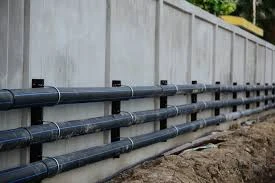Dec . 20, 2024 17:56 Back to list
pvc bar
Understanding PVC Bars Versatility and Applications
PVC, or polyvinyl chloride, is a widely used thermoplastic polymer that is known for its durability, affordability, and versatility. Among its many forms and applications, one of the most practical is the PVC bar. These bars, which come in various shapes and sizes, are utilized across numerous industries, including construction, manufacturing, and even in households.
What is a PVC Bar?
A PVC bar is essentially a solid piece of PVC material that can be extruded or molded into different shapes. These bars are typically available in lengths ranging from a few inches to several feet and can be cut to specific sizes as needed. PVC bars are known for their strength and resistance to weathering, making them suitable for both indoor and outdoor applications. Their lightweight nature, combined with their robust characteristics, makes them an ideal choice for a multitude of projects.
Key Features of PVC Bars
1. Durability PVC is resistant to many chemicals and environmental factors, such as moisture and UV rays. This means that PVC bars will not easily corrode, rust, or degrade, ensuring a long service life.
2. Lightweight Compared to metals and other materials, PVC is much lighter, which makes handling and transportation easier.
3. Cost-Effective The production of PVC is relatively inexpensive, and as a result, products made from PVC bars are typically more affordable than their counterparts made from other materials.
4. Easy to Work With PVC bars can be easily cut, drilled, and shaped, allowing for a wide range of applications without the need for specialized tools.
5. Insulating Properties PVC is a good insulator, which makes PVC bars suitable for electrical applications.
Applications of PVC Bars
pvc bar

PVC bars can be used in numerous ways, illustrating their versatility
1. Construction In the construction industry, PVC bars are often used for creating framework, supports, and partitions. They can also be used for cladding and as elements in window frames.
2. Manufacturing In various manufacturing processes, PVC bars are utilized for machinery parts, including gears, rollers, and guides due to their wear-resistance.
3. Signage The smooth surface of PVC bars can allow for easy painting or printing, making them ideal for signs and displays.
4. Household Uses In everyday life, PVC bars can be used for shelves, furniture components, and as protective barriers or safety rails in homes.
5. Automotive Applications Many automotive parts are made from PVC because it is lightweight and resistant to various chemicals.
Environmental Considerations
While PVC bars offer numerous benefits, there are also environmental considerations to bear in mind. The production of PVC can result in the release of harmful chemicals, and disposal can be challenging due to its non-biodegradable nature. However, there is a growing movement toward recycling PVC, and many manufacturers are developing more sustainable practices to reduce the environmental impact.
Conclusion
In conclusion, PVC bars are a remarkable example of the versatility and utility of polyvinyl chloride. Their durability, lightweight nature, cost-effectiveness, and ease of use make them an invaluable resource across various industries. Whether you are a contractor, a manufacturer, or a DIY enthusiast, understanding the benefits and applications of PVC bars can help you make informed decisions for your projects. As sustainability efforts continue to evolve, the future of PVC and its uses will also adapt, providing innovative solutions for various needs.
-
Durable PP Rigid Sheet: Lightweight, Chemical Resistant Solutions
NewsAug.21,2025
-
PVC Grey Sheet for Extraction: Chemical Resistant & Durable
NewsAug.19,2025
-
Durable PVC Pipe Fittings for Plumbing & Irrigation Needs
NewsAug.18,2025
-
HDPE Steel Belt Reinforced Spiral Corrugated Pipe | High Strength
NewsAug.17,2025
-
HDPE Pipe Fittings: Durable, Leak-Proof Solutions
NewsAug.16,2025
-
Premium CPVC Sheet: High-Temp & Chemical Resistant Solutions
NewsAug.15,2025

